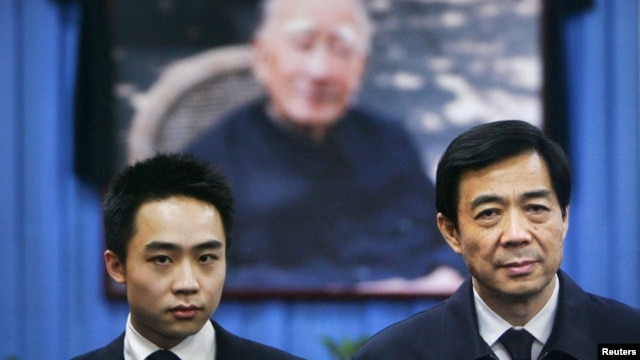News / Asia
Bo Xilai was Rising Star Before China Scandal
Bo Xilai was once considered a rising star in Chinese politics. He was thought to be a top candidate for elevation to China's all-powerful Politburo Standing Committee in November at the 18th Party Congress, which will pick a new generation of Chinese leaders.
But a political scandal that surfaced earlier this year derailed his career.
Bo was stripped from the top ranks of China's Communist Party when authorities became aware of allegations that his wife, Gu Kailai, was involved in the murder of a British businessman. She is serving a suspended life sentence.
Bo joined the Communist Party in 1980 and ascended through the ranks, holding posts as mayor of Dailan, governor of Liaoning province and commerce minister. In 2007, he was named leader of the southwestern city of Chongqing and rose to membership in the 25-member Politburo.
Bo gained prominence when he and police chief Wang Lijun launched a crackdown on corruption in Chongqing, resulting in the arrests and convictions of many officials. Bo's tenure was marked by strong support for state-owned enterprises, and he led a revival of Mao-era cultural themes and slogans aimed at re-instilling a socialist spirit.
But Bo left a mixed legacy in Chongqing, with some saying his improvements there covered up deeper problems.
Bo was once heir to a political dynasty. His father, Bo Yibo, was a founder of the People's Republic of China, and one of the eight leaders known as the "Eight Immortals." The group steered Chinese politics away from the legacy of Mao Zedong to the market-oriented reforms that have transformed China into an economic powerhouse.
The younger Bo has not been seen or heard from in months.
But a political scandal that surfaced earlier this year derailed his career.
Bo was stripped from the top ranks of China's Communist Party when authorities became aware of allegations that his wife, Gu Kailai, was involved in the murder of a British businessman. She is serving a suspended life sentence.
Bo joined the Communist Party in 1980 and ascended through the ranks, holding posts as mayor of Dailan, governor of Liaoning province and commerce minister. In 2007, he was named leader of the southwestern city of Chongqing and rose to membership in the 25-member Politburo.
Bo gained prominence when he and police chief Wang Lijun launched a crackdown on corruption in Chongqing, resulting in the arrests and convictions of many officials. Bo's tenure was marked by strong support for state-owned enterprises, and he led a revival of Mao-era cultural themes and slogans aimed at re-instilling a socialist spirit.
But Bo left a mixed legacy in Chongqing, with some saying his improvements there covered up deeper problems.
Bo was once heir to a political dynasty. His father, Bo Yibo, was a founder of the People's Republic of China, and one of the eight leaders known as the "Eight Immortals." The group steered Chinese politics away from the legacy of Mao Zedong to the market-oriented reforms that have transformed China into an economic powerhouse.
The younger Bo has not been seen or heard from in months.


No comments:
Post a Comment